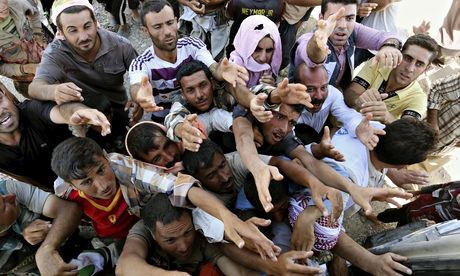
The Organisation for Economic Co-operation and Development (OECD) has urged the UK to maintain its commitment to foreign aid as it praised the country’s efforts in fighting global poverty despite the financial crisis.
The Paris-based thinktank said the UK should strive to maintain aid at the current level of 0.7% of national income, which it noted had been achieved despite “a challenging budget climate”.
The government has ruled out cuts to its budget for foreign aid, as well as safeguarding health and education, while other departments have faced reductions as the chancellor attempts to lower the deficit.
By raising its development assistance by 30.5% to £11.4bn in 2013, the UK was the world’s second largest donor by aid volume after the US.
The OECD said the UK was the first major economy to meet the 0.7% of national income target agreed by international donors in 1970. The average ratio achieved is 0.3%.
Erik Solheim, chairman of the OECD’s development assistance committee, said: “The UK has remained committed to fighting global poverty despite its own economic crisis and has fulfilled its promise to spend 0.7% of its gross national income on development aid. This is an impressive achievement and shows that a persistent political will can bring ambitious goals within reach.”
The UK’s Department for International Development (DfID) was also praised by the organisation for its focus on the neediest countries, including fragile states such as Afghanistan, Bangladesh and Ethiopia.
DfID’s recent work has included almost £40m of aid for people in northern and central Iraq who have fled Islamic State terrorists. It has also committed £230m to help fight Ebola in west Africa, and has committed £700m to Syria, focusing its efforts on protecting, counselling and schooling children. As well as praising the amount of aid committed, the OECD also complimented the UK on its distribution, noting the extra money was well targeted to have the greatest possible impact.
In 2012, the UK allocated 0.19% of gross national income to the least developed countries, above a United Nations goal of 0.15%.
The OECD argued however that the UK could do more to broaden the government’s development work by bringing in other departments to support aid programmes.
“It could also step up its efforts to ensure that domestic and foreign policies in areas like defence and migration support its development work and do more to monitor these efforts – an area where the UK’s performance has not improved since 2010,” it said in its latest peer review of the UK.
A spokeswoman for DfID said: “Investing in overseas development is creating a world that is healthier, more stable and increasingly prosperous. This is something Britain can be proud of.
“We believe in being a country that shapes the world. We are investing in the emerging markets of the future. Building economic growth and creating jobs helps developing countries lift themselves out of poverty.”

